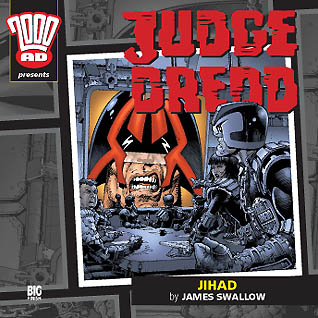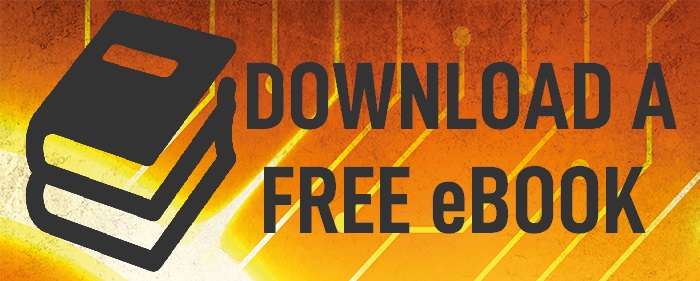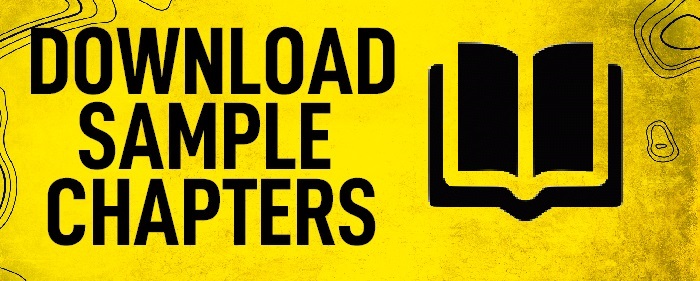
Judge Dredd: Jihad evolved out of a similar plotline about terrorists plotting to disrupt a conference of international Chief Judges I pitched to Big Finish in mid-2003; the original concept involved a time-travel element, and perhaps in retrospect I should have realised it wouldn’t make the cut, considering that BF pretty much have the time-traveler SF concept sewn up with their Doctor Who audio dramas…
Anyhow, producer John Ainsworth liked the conference element of the story and with direction from Alan Barnes at Rebellion, he asked me to take the terrorist attack concept and make the villains some old enemies from the past – the Judda. For those of you not familiar with the Judda, they were a renegade clan of religious fundamentalist Judges who appeared in the massive Oz storyline in 2000AD Progs 545-570 during 1987-88. Most of them died when Judge Dredd nuked their base inside Ayer’s Rock, but one (Kraken) survived to become Dredd’s replacement for a short time prior to the Necropolis storyline. They were a good choice for bad guys, and so I happily introduced a pair of Judda survivors to the plot, both of them intent on making Dredd pay for his defeat of their brethren.
The Judda in the story are Pandora and Jonah. Like the Judda in the comics, they both have names with biblical/mythological references. Pandora is from the Greek myth of the woman who opened the box given to her by Zeus that contained all the ills of the world; she metaphorically does the same thing in Jihad when she opens the box (the sleeper capsule) that contains the villain in an early scene. Jonah’s name comes from the biblical prophet who got swallowed by a whale; the name typically connotes a jinx or bad luck, and that’s certainly what Jonah is for Dredd. As he’s a “dark reflection” of Dredd, I gave him a similar sounding name (Jonah vs. Joseph, another bible character). Like his biblical counterpart, Jonah also spends three days in the belly of a “whale” (the ad-blimp). Their quasi-religious natures also gave rise to the title, which means ‘Holy War’ (alternative titles for this audio were Reap the Whirlwind and Unholy War). I also considered Return of the Judda, just for the Star Wars soundalike quality of it, but rejected that title because it gave away the identity of the baddies straight away. I wanted to try and maintain some sort of mystery about who they were. Following a suggestion from Alan, I worked in a few incidental lines of dialogue that hint that Jonah and Pandora were “failed” Judda, which goes some way to explaining why they weren’t killed with all the rest in the Oz storyline. In early drafts of the story, there was a third Judda named Hugo, but he fell victim to early revisions – as did Judge Dredd’s robot secretary Servo-Drone…
Jihad also features the first appearence of Oz Judge Hogan (named after actor/comedian Paul Hogan); in the first draft of the script he was a character from the Oz mega-epic, Judge Bruce, until a friend of mine pointed out that Bruce had died during the Judgement Day story… Other characters include Doctor Adam Ipcress (whose first name is taken from a friend of mine and his surname is from the Len Deighton book and film The Ipcress File) and several foreign Judges; Houston is named after film director John Houston; Levy, Keith and McIntee are named after more of my friends; Ortiz is an incidental character I created for my Judge Dredd novel Eclipse, named after a character from the TV show seaQuest DSV; Crilly is named after Ted Crilly, the titular character of the sitcom Father Ted; Wong is named after Amy Wong from Futurama; and Sven is named after Ren Hoek’s idiot cousin from the cartoon Ren & Stimpy.
The transport ship Princess Kylie is a nod to Aussie idol singer Kylie Minogue; the only other Australian star namechecked in Jihad is the equally famous Dame Edna… The Corazon del Oro is Spanish for Heart of Gold, Zaphod Beeblebrox’s ship in The Hitch Hikers Guide to the Galaxy.
Billy Shatner Overzoom pays homage to actor William Shatner, star of Star Trek and TJ Hooker. Gabe Tyler Megway is named after Gabriel Tyler, a character from my Sundowners series of novels.
One of the voices on Dredd’s informant hotline says “I’ve gone and done it again…” which are the words of the serial killer John Doe when he calls the police operator in the movie Seven.
When Jonah says “Ashes to ashes, dust to dust” he’s not just quoting scripture (or David Bowie), he’s also hinting at the manner of death for the Chief Judges…
The advert jingle broadcast by the blimp is for the icky junk food snack Grot-Pot; it was previously heard in the Judge Dredd audio drama Wanted: Dredd or Alive.
Dredd asks the robot spy “What’s your operating number?”, a line from Star Wars; actor Garrick Hagon, who plays Jonah, appeared in that movie as Biggs Darklighter, the ill-fated X-Wing pilot.
The Judda scenes in the Judgementarian cathedral feature echoes of lines from the John Wagner’s scripts for the Oz storylines, in the moments when Pandora and Jonah speak the ‘holy writ’ of Judd. Jonah’s “flashback” describes the events of Dredd’s defeat of the Judda, but from a wholly skewed perspective…
“Maybe Ipcress left a file.” Another reference to, of course, The Ipcress File.
The General Arms Mark Three Arbitrator shotgun appears in the Dredd vs. Death video game; the scene where Dredd reels off its capabilities is a homage to Clint Eastwood’s “Do you feel lucky?” speech in Dirty Harry. Dredd later uses the Widowmaker, a powerful comination shotgun & submachinegun that has appeared in more recent 2000AD Progs.
The registration number for the ad-blimp is the same as that of the Commercial Towing Vehicle Nostromo from the movie Alien.
Dredd talks about “paying a hostile visit”, a reference to an episode of Space: Above and Beyond of the same name.
Hogan’s line “You’re loaded for bear, buckaroo.” comes from the cult classic The Adventures of Buckaroo Banzai Across the 8th Dimension.
When Dredd wonders aloud if Jonah bought a job-lot of servo-droids, it’s a sly wink towards the fact that we had a smaller cast this time around, which is why all the robots encountered sound a little similar…
“That’s behind door number three!” is a reference to the game show Let’s Make A Deal.
Dredd’s battle with the Dreddclones isn’t the first time he’s fought a ‘carbon copy’ – he’s also faced robot duplicates and a zombie version of himself from a parallel future.
Jonah’s line “All too easy…” recalls Darth Vader’s comment in The Empire Strikes Back. The Vader/Luke fight sequence from that movie (and also the climactic Connor/Kurgan swordfight from Highlander) inspired this scene.
Dredd’s last second arrival to neutralise the nano-swarm is an oblique nod to a similar scene in Escape from New York.
References to characters and past 2000AD stories include mentions of the necromancer Sabbat, the Judge Child Quest and the Angel Gang, Judge Death, Judge Cal as well as the Empire State Building, which appeared in the very first Judge Dredd strip.
In addition, there are hidden references in some of the announcements put out over the public address system in the Grand Hall of Justice, including locations like Ryder Mall (from the Dredd vs. Death videogame), Barry Waffle Plaza (which appears in my Judge Dredd novel Eclipse) and city blocks named after dragon-loving novelist Anne McCaffery and Fight Club‘s anarchist Tyler Durden. There are also mentions of Judges Cruise and Diego, two characters from my time running the original Games Workshop Judge Dredd Role Playing Game.


